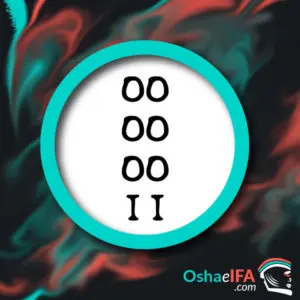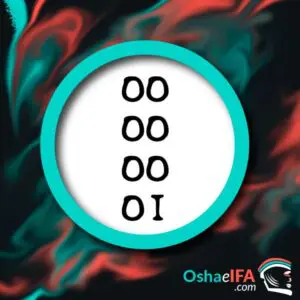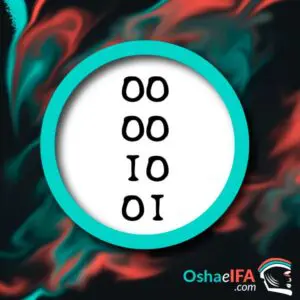Okana Otura

Okana Otura (Okana Turale), is odu of the wasp, which represents the defense of truth, the impact of our actions and the cruciality of spiritual communication. This Ifá sign emphasizes that each choice carries a consequence and highlights the importance of being alert and prepared in the face of any adversity.
Analysis and reflection of the Odu of Ifa Okana Otura
The Ifa sign Okana Otura reminds us that, although we face conflicts and challenges, both in the family environment and in other spheres of our lives, it is crucial to maintain an attitude of respect towards ourselves and others. It urges us to live with integrity, honoring our debts and commitments, both material and spiritual, and to act with wisdom and prudence in our decisions.
Economic Aspects:
In the economic field, Okana Otura warns about greed and the consequences of actions driven by envy and betrayal. The sign emphasizes the need to manage our material possessions with integrity, preventing personal efforts from benefiting others without due recognition. It calls us to settle debts with the Saints and receive Orunmila, which suggests the importance of honoring our spiritual and material debts to ensure the flow of abundance in our lives.
Health:
From a health perspective, this Odu highlights various conditions, from scrotal hernias to digestive system complications, urging proactive attention to physical well-being. The ban on consuming alcoholic beverages and the recommendation to take care of your diet emerge as reminders of the connection between our daily choices and our long-term health.
Religious Aspects:
Religiously, Okana Otura stands as a bastion of spiritual wisdom. The call to avoid ingratitude and to properly serve the Orishas such as Eshu and Ogun, through specific sacrifices, reflects the need to maintain a harmonious and respectful relationship with the divine.. This Odu emphasizes the importance of spiritual guidance and the fulfillment of religious obligations as pillars of a balanced and full life.
Personal relationships:
In the area of love and personal relationships, Okana Tura warns about family separations and neighborhood conflicts caused by gossip. This sign teaches us about the fragility of human relationships and the ease with which they can be damaged by misunderstandings and falsehoods.. The mention of women hiding their past and the possibility of facing romantic deception underlines the need for transparency and honesty in our personal interactions.
The essence of Okana Otura lies in its ability to mirror the complexity of life, offering lessons on the importance of spiritual communication.
Immerse yourself in the legend of Oggun, the Orisha who forges destiny with iron and fire.
Signo Okana Otura Overview
The Odu Okana Otura is Kaferefun Shangó, Eleguá and Yemayá, chronicles the creation of Earth and the separation of the Sun and Earth, offering insight into the cyclical nature of life and relationships.
Names or Aliases:
- Okana Otura.
- Okana Turale.
- Okanran Otura.
- Okana Turales.
What is born in the Odu of Ifá Okana Otura?
- The wasp, a poisonous animal.
- The separation of the Sun and the Earth.
- Yoko Osha's costume from Elegua.
- In Okana Otura, the formation of the Earth is born.
- This is where the person communicated with their spirit guide.
- Eating peaches and bananas is prohibited.
- It marks Olofin's curse on the Earth.
- The mouth did not perform Ebbó.
- Greed is mentioned.
- It is prohibited to drink alcoholic beverages and be talkative at public gatherings.
What does the Okana Otura sign talk about?
- Talk about disagreements with neighbors due to gossip.
- He mentions women who are not maidens and they hide it.
- This Odu is spoken by: Shangó, Elegbá, Yemayá, Oshun, Eshu, Olokun, Ogun, Oduduwa, Egun, Orunmila, Oyá, Olorun and Guardian Angel.
- A green sash must be worn.
- It is important to prevent personal efforts from solely benefiting others.
The Okana Otura sign points out:
- The diseases are: scrotal hernia, digestive system problems, operations on the stomach, duodenum, gallbladder, nervous tics, detachment of the womb, oral germs and detachment of the uterus.
- The herb of this Odu is Tua Tua.
- Okana Otura marks debts and lack of respect towards the Saints.
- Indicates family separation.
You may also like: Odu of Ifa Otura Tiku
Sayings of the Odu of Ifa Okana Turale:
- Food comes in smelling good and comes out stinky.
- Gunpowder saves and gunpowder kills.
- What you do to me, I do to you.
"What you do to me, I do to you" reflects the principle of reciprocity in human relationships. This saying teaches us about justice and balance, reminding us that our actions towards others will be reflected in how they treat us, thus forging the foundation of mutual respect.
Odu Okana Tura Ifa Code of Ethics:
- The Awó does not go around with effeminates so that they do not confuse him.
Meaning of the Ifá Sign Okana Otura:
The Odu Okana Otura addresses conflicts in family and other relationships, mainly due to disputes over material possessions. This sign warns of a curse from Olofin on the Earth, caused by human envy and betrayal.
Highlights the importance of performing Ebó as Orunmila recommended; Ignoring it can lead to unwanted consequences, including feeling shame for previously enjoyed actions. The possibility of falling into unexpected behavior if this advice is ignored is mentioned.
The Tua-Tua plant is significant in this Odu, symbolizing the connection with the spiritual and the need to communicate with spiritual guide in both good and bad times.
It is recommended to wear a green sash and perform head prayers with pullets. In addition, the consumption of peaches and bananas is prohibited and the origin of the Yoko-Osha costume from Elegua is mentioned.
This sign also warns about the dangers of eating hastily and without caution, as well as attending dinners without performing the necessary Ebós, which can result in illness or weakness.
Okana Otura stresses the importance of honesty and moderation, and advises against associating with people who may lead to confusion. Greed and falsehoods are especially frowned upon under this sign.
Oral and digestive health is a prominent concern; Problems derived from poor eating habits and the presence of oral germs can significantly affect general well-being.
The consumption of alcoholic beverages is strictly prohibited, as is speaking negatively about others. Okana Turale emphasizes that each person lives according to their own circumstances and that it is important to remember that we do not know the future impact of our actions on the lives of others.
Okana Otura advises caution regarding surgeries of the stomach, duodenum or gallbladder and warns about three potential enemies. The need to perform Ebó to free oneself from these negative influences is emphasized and the danger of deception is warned, especially in romantic relationships.
Debts to the Saints must be settled, and it is crucial to receive Orunmila to avoid adverse consequences. Involuntary expressions, such as grimaces or nervous tics, are signs to watch out for.
Finally, it warns about legal complications and the negative influence of third parties, remembering that no one is free from the influence of those who exercise power over us. The Earth, like our lives, is in constant motion around the Sun, symbolizing the interconnection of all things.
Know more Elegua, the guardian of the crossroads
Says Ifa Okana Turale:
Ifá says in Okana Otura that the person under this Odu can face compromising situations, even getting involved in tragedies. He is advised not to come when he is called for a problem, as he might find himself in unpleasant circumstances.
When the Ifá sign Okana Otura manifests in an ordinary register and is in Ire, it indicates to the person that, despite facing difficulties in understanding, they must persevere after making the sacrifice with a chicken and four slugs. In case of Osobo, the sacrifice must be discarded.
Ifá says that, when this Odu appears in an ordinary record, it is crucial to make sacrifices to prevent personal efforts from unfairly benefiting others.
For a woman, if Okana Otura is revealed in an ordinary record, she is suggested to marry a Babalawo as a solution to the problems she will face with a black man who will show interest in her and will be rejected. If she is dealing with a man, she is informed that a black woman will seek to marry him, and she should accept her only after having received Ifá.
Ifá says in Okana Turale that, when this sign appears in Igbodu, the person must abstain from consuming alcoholic beverages and limit their participation in conversations at meetings and public gatherings.
Furthermore, if this sign occurs in Igbodu, it is likely that the person will not show gratitude towards the Awó who prepared his Ifá, generating conflicts. He is instructed to serve Eshu with a goat and Ogun with a rooster, and is prohibited from eating bananas.
Prayer of the Odu Okana Otura:
OKANA TURALES IFA IRE OKANA NIMASEKU LEGUENI OLORUN AMIBINU
MAFEREFUN OLORUN ATI ORUNMILA ADIFAFUN OBATALA ATI OSHUN.
Ebó of Odu Okana Otura:
Head Prayer for Odu Okana Otura:
- A head prayer should be performed with a pullet.
Ebbó for the Okana Otura sign:
- For this Ebó, the following are required: a rooster, two pigeons, 16 sharp sticks, the sash that the person wears, a bunch of hot chili, dew collected with a sponge in a gourd and a significant amount of money.
You may also like: Treaty of the Oshe Di sign
Pataki (story) of the Ifa sign Okana Otura:
The sailor's wife
There was a woman who had four children, each from a different father. She decided to marry a merchant sailor, and together they made a home with children. While she worked, her mother-in-law took care of the children. At her work, she met another man and began a clandestine relationship. Over time, this man became impotent, and she no longer wanted to continue the relationship.
However, he would not leave her alone and blackmailed her, threatening to reveal her infidelity to her husband, since he had a portrait of her. Her situation worsened when her lover, in a drunken state, came to her house to insult and mistreat her.
Desperate, the woman sought Orunmila's help, fearing for her reputation and her marriage, especially since she had previously been accused of infidelity. Orunmila performed an osode on him and prescribed him to perform Ebó. Following Orunmila's instructions, the woman managed to free herself from her harasser.
Explanation: History teaches us about the consequences of our decisions and the importance of facing our problems. Seeking spiritual or wisdom help can offer us a way out of situations that seem to have no solution. Honesty with oneself and with others is essential to live in peace and harmony.
You may also like: Sign of Ifa Ogbe She (8-5)
Okana Otrupon Ifa Traditional
OKÀNRÀN ÒTÚRÁ
Òkànràn you you
Babaláwo Enu ló día fun Enu
Enu ni n sawoó re Agbaa Ègbòo Fè Olúkiribítí
Enú bá de Agbaa Ègbòo Fè
Wón bá tjú Enu
Tea dÒnÍ
enu là n bo
osà lenu
Enu nìbo ru
Enu nibo yè
Bí ón se oúnje Sílè
Enu nió je é
Well, ohun múmu
Enu náà ní or je é
Enú heh, Enú mu tán
Ní bá n sàdúà
I'll go bá dé
Neither wón wá n jó nor wón n yò
Wón n yin àwon Babaláwo
Àwon Babaláwo n yin Ifá
Ó ni béè ni Babaláwo tòún wí
Òkànràn you you
Babaláwo Enu ló día fun Enu
Enu ni n sawoó re Agbaa Ègbòo Fè Olúkiribítí
Enu mòmò lEgúngún or
Enu mòmò lÒrìsà
Enu ni won n bo lóótù Ifè
Táyé fí n dara
E jé á rójú ká móo bo enu
Enu mòmò lÒrò.
Ifá advises this person to offer sacrifice to the mouth. He must prepare food and drinks to entertain people. Ifá says that if they do this, they will pray for him, so that things will improve for him.
Òkànràn you you
It is the Babaláwo of the Mouth who made divination for the Mouth
When La Boca was venturing his priesthood in Àgbá Ègbò Ifè Olúkiribítí
When La Boca came to town
They entertained him
Till the date
All of us are offering sacrifice to the Mouth
Because the Mouth is a Deity
The mouth is the target of acceptability of sacrifices
He is the only one to sacrifice for survival
If they cook any food
It is the mouth that will eat it
If they prepare any drink
It is the mouth that would consume it
La Boca ended up eating and drinking
And began to pray
And the good things came
They began to dance and rejoice
They were praising their Babaláwo
His Babaláwo was praising Ifá
They said it was as their Babaláwo had predicted
Òkànràn you you
It is the Babaláwo of the Mouth who made divination for the Mouth
When La Boca was venturing his priesthood in Àgbá Ègbò Ifè Olúkiribítí
The Mouth is the Masquerade
La Boca is the Òrìsà
It is to La Boca that they are offering the sacrifices in the city of Ifè
That is making life livably better
Let us try to offer sacrifices to the Mouth
La Boca is the word.















This is very good but why the research work covers only Yoruba culture alone? For if you come to Ghana 🇬🇭 in the Volta region, the Anlo Ewe speaking people also practice Ifa or Èfa.
The items more especially the names of herbs and the names of orisha/vodu are all in Yoruba languege.